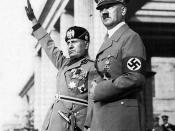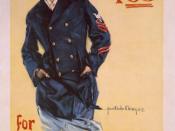Women's Support Roles in the World Wars Right up to the outbreak of World War I, feminists on both sides pledged themselves to peace, in transnational women's solidarity. Within months of the war's outbreak, however, "all the major feminist groups of the belligerents had given a new pledge - to support their respective governments." Suddenly, campaigners for women's suffrage became avid patriots and organizers of women in support of the war effort. Many of these feminists hoped that patriotic support of the war would enhance the prospects for women's suffrage after the war, and this came true in a number of countries.
The more than 25,000 US women who served in Europe in World War I did so on an entrepreneurial basis, especially before 1917. They helped nurse the wounded, provide food and other supplies to the military, serve as telephone operators (the "Hello Girls"), entertain troops, and work as journalists.
Many of these "self-selected adventurous women ... found their own work, improvised their own tools ... argued, persuaded, and scrounged for supplies. They created new organizations where none had existed." Despite hardships, the women had "fun" and "were glad they went." Women sent out to "canteen" for the US Army - providing entertainment, sewing on buttons, handing out cigarettes and sweets - were "virtuous women" sent to "keep the boys straight." Army efforts to keep women to the rear proved difficult. "Women kept ignoring orders to leave the troops they were looking after, and bobbing up again after they had been sent to the rear." Some of the US women became "horrifyingly bloodthirsty" in response to atrocity stories and exposure to the effects of combat. Looking back, the American women exhibited "contradictory feelings" of sadness about the war, horror at what they had seen, and pride in their...


